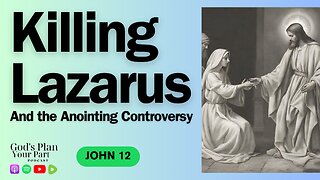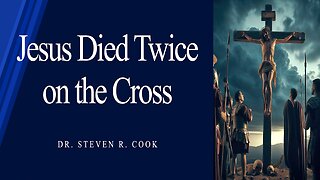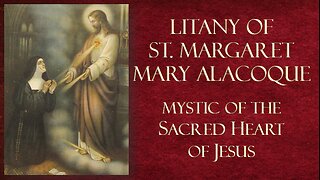Episode 1610: The Fifth Sword of Sorrow - Mary stands near the Cross of her Son Jesus
John 19:25-27
“Now there stood by the cross of Jesus, his mother, and his mother’s sister, Mary of Cleophas, and Mary Magdalen.
When Jesus therefore had seen his mother and the disciple standing whom he loved, he saith to his mother: Woman, behold thy son.
After that, he saith to the disciple: Behold thy mother. And from that hour, the disciple took her to his own."
John 19:25-27 is seen as a profound moment during the crucifixion of Jesus that carries important theological and spiritual significance. Here are some key points of interpretation:
Mary as the Mother of All Believers: When Jesus says to Mary, "Woman, behold thy son," and to John, "Behold thy mother," it is understood symbolically that Jesus is entrusting Mary to the care of all believers and, in turn, entrusting all believers to the care of Mary. This signifies her role as the spiritual mother of all Christians.
The title "Mary, Mother of All Believers" (Latin: Mater omnium fidelium) holds a special place in Catholic Marian theology. Here are some key points regarding this aspect of Mary's role:
Universal Maternity: The title signifies Mary's spiritual motherhood over all believers in Jesus Christ. This maternal relationship is not limited to a specific time, place, or group of people, but extends to all who are part of the body of Christ, regardless of nationality, ethnicity, or background.
Foreshadowing in Scripture: This understanding of Mary's universal maternity finds its roots in the words of Jesus from the cross in John 19:25-27, where He entrusts Mary to the care of the beloved disciple, often interpreted as a symbol of all humanity. This passage is seen as a foreshadowing of Mary's role as the spiritual mother of all Christians.
Eve as Mother of All the Living: In Catholic tradition, Mary is often likened to the New Eve. Just as Eve is considered the mother of all the living according to the flesh (Genesis 3:20), Mary is regarded as the mother of all the living in the order of grace. She is seen as participating in the spiritual regeneration of humanity through her cooperation with God's plan of redemption.
Mediatrix of Graces: This title is closely related to the concept of Mary as the Mediatrix of Graces. According to Catholic teaching, Mary intercedes on behalf of humanity, imploring her Son to bestow graces upon believers. As the Mother of All Believers, her intercession is understood to be universal, encompassing the needs and aspirations of all Christians.
Model of Faith and Discipleship: Mary's example of faith, obedience, and total surrender to the will of God serves as a model for all believers. Her "yes" to the angel Gabriel at the Annunciation is considered a paradigm of the Christian response to God's call.
Motherly Care and Protection: Catholics believe that Mary's maternal love and care extend to each individual believer. Many turn to her in times of need, seeking her intercession for guidance, comfort, and protection.
Pope Paul VI's Title of Mary as "Mother of the Church": Pope Paul VI officially bestowed the title "Mother of the Church" on Mary in 1964. This title emphasizes Mary's maternal role in the life of the Church and her care for the spiritual well-being of all believers.
It's important to note that while this understanding of Mary's universal maternity is a significant aspect of Catholic Marian devotion, it is not universally accepted by all Christian traditions. Different Christian denominations have varying perspectives on Mary's role and significance in the life of faith.
The New Eve: Mary is often seen as the New Eve, in contrast to the Old Testament Eve who played a significant role in the Fall. By accepting John as her spiritual son, Mary becomes a symbol of the Church and of humanity itself. Through her obedience to God's will, she participates in the redemption of humanity alongside her Son, Jesus Christ.
The concept of Mary as the New Eve is a significant theological theme in Catholic tradition. It draws parallels between Mary and the biblical figure of Eve, highlighting Mary's role in the redemption of humanity through her obedience and cooperation with God's plan. Here are some key points regarding the New Eve:
Eve's Disobedience and the Fall: According to the Genesis account (Genesis 3), Eve, the first woman, played a pivotal role in the disobedience that led to the Fall of humanity. She succumbed to the serpent's temptation and ate the forbidden fruit, bringing sin and death into the world.
Mary's Obedience and Fiat: In contrast, Mary's response to the angel Gabriel's announcement at the Annunciation (Luke 1:26-38) is often seen as a reversal of Eve's disobedience. Mary's "fiat" (Latin for "let it be done") expresses her complete and willing submission to God's plan. She humbly accepts the role of becoming the mother of the Messiah, thus initiating the redemption of humanity.
The Woman of Revelation: In the Book of Revelation (Revelation 12:1-6), there is a vision of a woman clothed with the sun, with the moon under her feet, and a crown of twelve stars on her head. Catholic tradition identifies this woman with both Mary and the Church. This image further reinforces Mary's role in the cosmic battle against evil and her unique position in the plan of salvation.
Co-Redemptrix and Mediatrix: Some Catholic theologians use the title "Co-Redemptrix" to emphasize Mary's participation in the redemptive work of Jesus Christ. This title is not meant to suggest an equal role with Christ, but rather to acknowledge her unique cooperation with His salvific mission. Additionally, Mary is often referred to as the "Mediatrix of All Graces," highlighting her intercessory role in obtaining graces for humanity.
Symbol of the Church: Mary's role as the New Eve also signifies her connection to the Church. Just as Eve was the mother of all the living according to the flesh, Mary is considered the mother of all the living in the order of grace, nurturing and caring for the spiritual children of God.
Eve's Restoration through Mary: The New Eve concept reflects the belief that, through Mary's obedient response, God initiated the process of restoring what was lost through the disobedience of the first Eve. Mary's cooperation with God's plan allows for the possibility of redemption and reconciliation with God.
It's important to note that while the New Eve concept is a significant aspect of Catholic Marian theology, it is not universally accepted by all Christian traditions. Different denominations have varying perspectives on Mary's role and significance in the life of faith.
The Importance of Spiritual Motherhood: This passage highlights the importance of spiritual motherhood within the Christian community. It emphasizes the idea that believers are not isolated individuals, but part of a larger spiritual family. This concept is central to Catholic devotion to Mary and her intercessory role.
The concept of spiritual motherhood is significant in Catholic theology and spirituality. It emphasizes the idea that certain individuals, particularly women, can play a maternal role in the spiritual growth and well-being of others, even if they are not biological mothers. Here are some key points regarding the importance of spiritual motherhood:
Nurturing and Caring: Spiritual mothers are seen as individuals who possess a nurturing and caring disposition. They offer emotional support, guidance, and encouragement to those in need, much like a mother would for her children.
Role Models of Faith: Spiritual mothers often serve as role models of faith and virtue. They exemplify qualities such as humility, selflessness, compassion, and a deep relationship with God. Their example inspires others to grow in their own faith journey.
Intercession and Prayer: Spiritual mothers are often known for their powerful intercessory prayer. They lift up the needs and concerns of others in prayer, asking for God's grace, protection, and guidance on their behalf.
Mentoring and Discipleship: Spiritual mothers may take on a mentorship or discipleship role, offering guidance and teaching in matters of faith, morality, and Christian living. They help others navigate the challenges of life with a foundation in spiritual wisdom.
Supporting Personal Growth: Just as a mother supports the growth and development of her children, spiritual mothers seek to facilitate the spiritual growth and development of those under their care. This can involve providing guidance in discerning God's will, offering advice on life decisions, and helping individuals develop their gifts and talents for God's service.
Creating a Sense of Belonging: Spiritual mothers foster a sense of belonging and community within the Church. They create environments where individuals feel loved, accepted, and valued, helping them to find their place in the family of God.
Healing and Restoration: Like a mother's love can bring healing and comfort, spiritual mothers often play a crucial role in helping individuals overcome wounds, past hurts, and struggles. They offer a safe space for emotional and spiritual healing.
Embodying the Maternal Aspects of God: Spiritual mothers reflect the maternal aspects of God's character. They embody God's nurturing, caring, and protective nature, providing a tangible representation of God's love for His people.
Fulfillment of the Call to Love One Another: Jesus emphasized the importance of love and care within the Christian community (John 13:34-35). Spiritual motherhood exemplifies this command by extending maternal love and care to those in need.
It's important to note that spiritual motherhood is not limited to women. Men can also exhibit maternal qualities in their care and guidance for others. Additionally, the concept of spiritual motherhood is not exclusive to any particular religious tradition and can be found in various forms across different Christian denominations.
The Compassion of Jesus: Even in the midst of his own suffering on the Cross, Jesus demonstrates profound compassion for his mother. This shows his humanity and emphasizes the importance of honoring and caring for our parents and loved ones.
Continuity of Family: In entrusting Mary to John, Jesus is ensuring that there is a continuity of care and support for his mother. This is a reminder of the importance of family ties and responsibilities within the Christian community.
Overall, this passage is viewed as a powerful testament to the close bond between Jesus and Mary, and the profound spiritual implications for all believers. It emphasizes the role of Mary as a maternal figure in the life of the Church and calls on Christians to honor and emulate her example of faith and obedience to God.
-
 42:47
42:47
CatholicReboot
8 months agoEpisode 1595: The Third Sword of Sorrow - Mary seeks Jesus lost in Jerusalem
73 -
 34:43
34:43
CatholicReboot
8 months ago $0.01 earnedEpisode 1619: The Sixth Sword of Sorrow - Mary receives Jesus into her arms
184 -
 20:38
20:38
Gods Plan Your Part
3 months agoJohn 12 | Killing Lazarus, Mary’s Anointing, Biblical Contradictions?
23 -
 7:00
7:00
America Needs Fatima
2 months agoVirgin Mary Heals Woman at Lourdes
31 -
 5:43
5:43
News from Jesus
8 months agoSep 19, 2016 ❤️ Jesus says... This is My Body, given for you, do this in Remembrance of Me
294 -
 22:20
22:20
Thinking on Scripture
7 months agoJesus Died Twice on the Cross
158 -
 21:50
21:50
Gods Plan Your Part
6 months agoMatthew 16 | Remember What God Has Done For You And Carry the Cross
221 -
 4:53
4:53
Sorrowful and Immaculate Heart of Mary Catholic Channel
8 months agoPrayer-Litany of St. Margaret Mary Alacoque: Mystic of the Sacred Heart of Jesus
84 -
 1:50:42
1:50:42
elderry
6 months agoJesus, The Main Character of the Christmas Story (Part 6) | Pastor Roger Jimenez
26 -
 5:39
5:39
Christian Testimonials, Bible Scriptures and Commentary
3 months agoJesus Sacrificial Death on the Cross Burial and Resurrection- Salvation
558